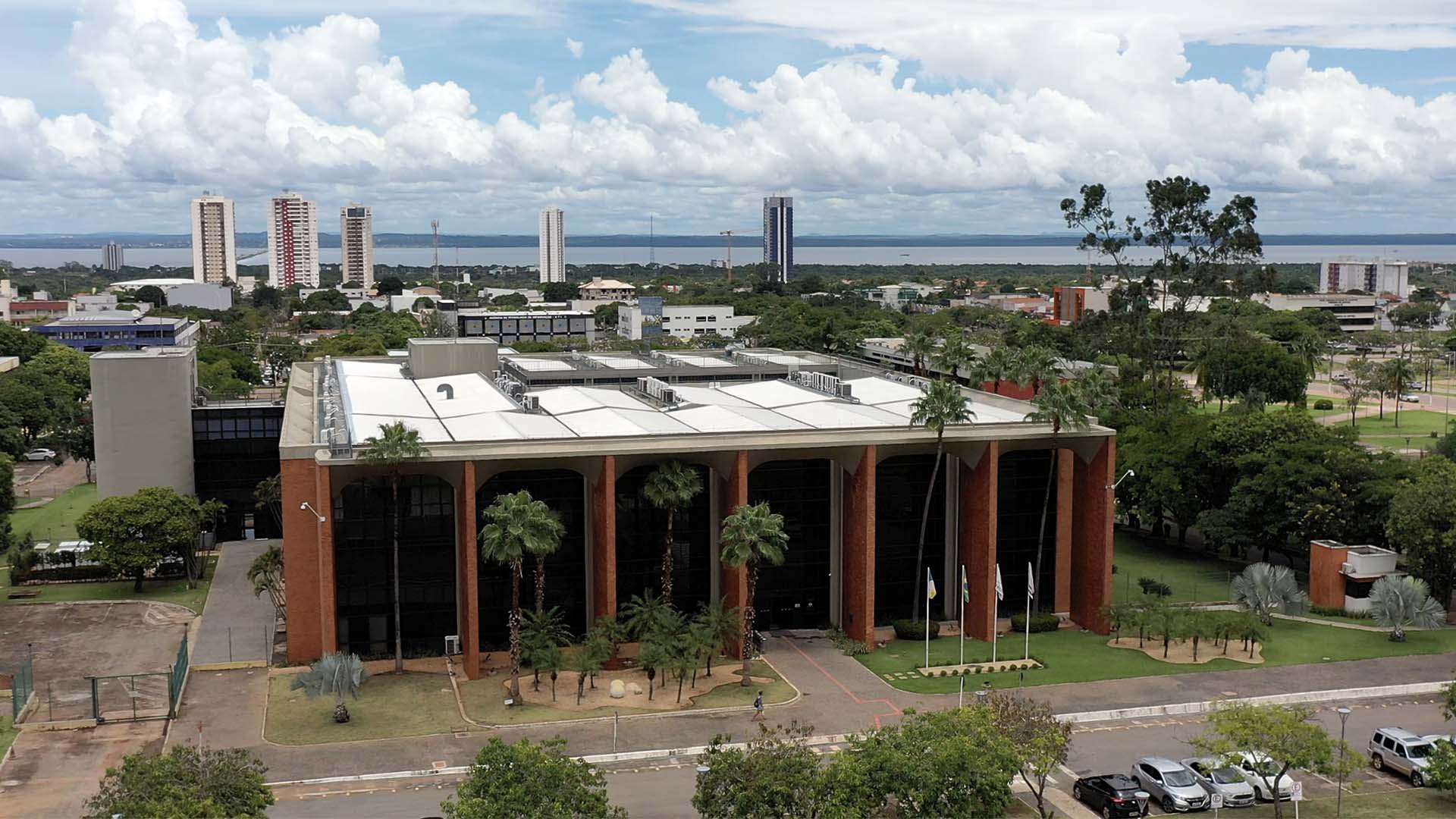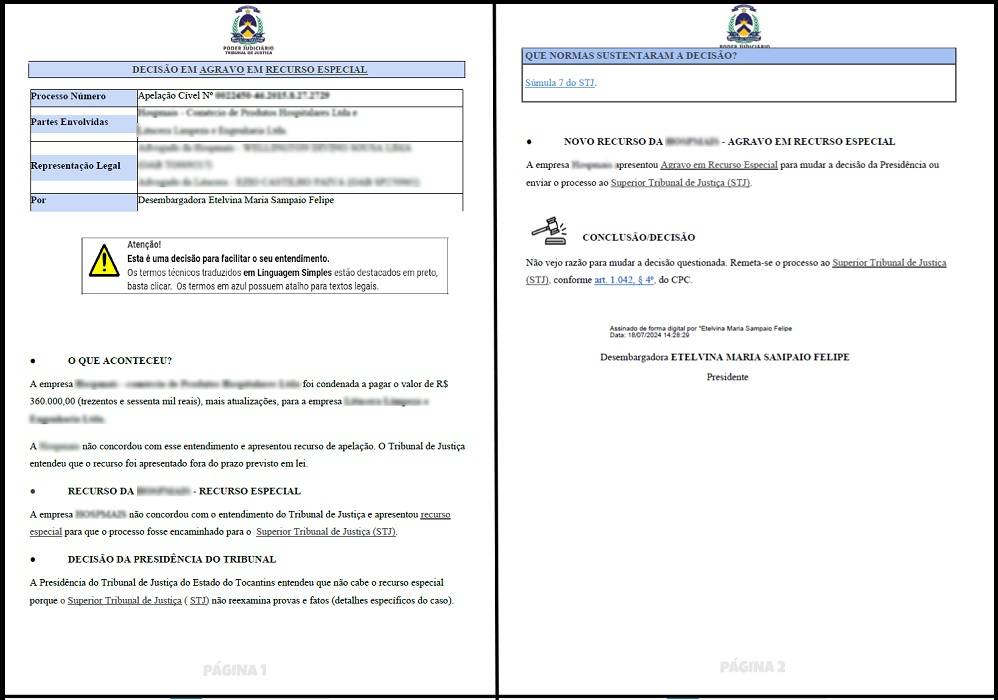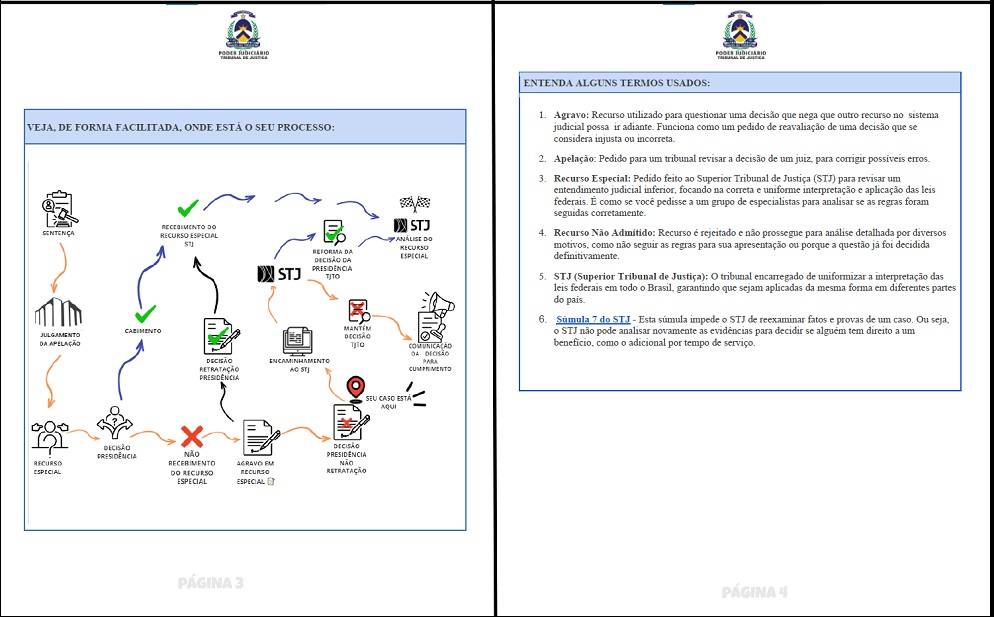
In July, the Presidency of the Court of Justice of the State of Tocantins (TJTO) published the first court decisions in simple language, as a result of a project developed in the Judiciary of the State of Tocantins to produce decisions in simple language and allow everyone to understand what is being judged in each case.
The initiative is part of a project by the CPAI (Permanent Commission for Accessibility and Inclusion) of the Court of Justice, chaired by Justice Pedro Nelson de Miranda Coutinho, in line with the "SimpleTOC" Program, implemented in November of 2023, before the TJTO joined the National Pact for Simple Language, launched by the National Council of Justice (CNJ) in 2023. The Pact aims to encourage the use of simple language throughout the Brazilian judiciary, as a way of promoting access to justice and strengthening citizenship.
It also complies with the same recommendation No. 144 of the council that the courts and councils of the Judiciary, with the exception of the Federal Supreme Court (STF), use simple, clear and accessible language instead of legal language, which is considered complex, not accessible, not inclusive and which makes it difficult for all people to understand court documents.
Simple language is a way of writing and communicating in a clear, concise and objective manner, avoiding jargon and complex technical terms that are very common in the legal environment. The aim is to ensure that anyone, regardless of their level of education or legal knowledge, can understand the content of a document.
PROJECT LED TO MODEL COURT DECISION
According to the CPAI, the decisions are part of a pilot project, the "Decision in an Interlocutory Appeal in Simple Language", to implement simple language in court decisions. The aim is to create a model judicial decision that is easier to understand, using simple terms and visual resources, and it will be completed by the end of the year.
According to the CPAI, the project emerged during the Course on Simple Language Agents at the Superior School of the Judges (Esmat), in which a group of participants, the "Chambari" - in reference to the cuisine and typical culture of the State of Tocantins - presented a draft of a simplified decision as their final product, which was sent to the President of the Court of Justice to be adapted and approved as a model. From then on, three versions of the same type of decision by the President were tested for comprehension by internal and external audiences aged between 18 and 80.
Ten decisions are published in simple language and with a layout using visual resources to make them easier to understand. According to the project, in this pilot, the simple language is being implemented in "Interlocutory Appeal" cases. The documents already published deal with cases involving the validation of a degree obtained abroad by a university in the State of Tocantins and a collection action among companies.
Learn about the type of case heard and the model decision in simple language

 In this model, the case analyzed was decided on July 18th, in which a hospital products trading company was ordered to pay an amount to another, but disagreed with the decision and filed an appeal (called an appeal) with the Court of Justice.
In this model, the case analyzed was decided on July 18th, in which a hospital products trading company was ordered to pay an amount to another, but disagreed with the decision and filed an appeal (called an appeal) with the Court of Justice.
The Court did not accept the appeal because it had been filed after the deadline, which prompted a new appeal, called a Special Appeal. This appeal is used when a party to a case disagrees with the decision of the court on an appeal and asks for the case to be referred to the Superior Court of Justice, the STJ.
In this case, in another decision, the President of the Court of Justice ruled that the special appeal was not appropriate, based on the understanding that the STJ does not re-examine specific details (the evidence and facts) of cases judged by the courts.
The company filed yet another appeal, called an "Interlocutory Appeal" to change the decision of the President. The President then decided, in simple language, that she would not change her own decision, but referred the case to the Superior Court of Justice (STJ).
SEVEN MORE SIMPLE LANGUAGE INITIATIVES RECEIVE NATIONAL AWARDS
In addition to the project to produce decisions in simple language, the Court of Justice of the State of Tocantins submitted seven other initiatives to the Quality Award of the CNJ in 2024, which have been implemented in the Judiciary of the State of Tocantins to use simple, clear and accessible language to make information easier to understand.
1) SimpleTOC - Simple Language Program of the TJTO. Established by the Joint Ordinance No. 16/2023, it provides strategies to improve the communication of the Judiciary of the State of Tocantins with society through the use of simple language and visual facilitation, making it clearer and more accessible to anyone, regardless of legal knowledge and without losing technical precision. The strategies include management and regulation, awareness-raising/training, partnerships such as the creation of the SimpleTOC Network, simplification of documents such as the Meta 5 Booklet and the Simplified PLS, as well as an event to award innovative initiatives involving simple language and monitoring for adjustments.
2) Redesigning Justice: Visual Facilitation and Simple Language for Efficient Public Services. Run by the Innovation Center (Inovassol), this is a training project for the judicial staff to implement the SimpleTOC Program, which was carried out last year.
3) Unveiling the Sustainable Logistics Plan. Developed by the Innovation Center (Inovassol), it provides accessible and comprehensible material to civil servers to facilitate understanding of the Sustainable Logistics Plan of the Judiciary.
4) A SimpleTOC in the TJDFT+Simple distance learning program. A collaborative initiative between the TJTO and the TJDFT democratizes access to simple language in the judiciary by adapting a course on simple language, originally developed by the TJDFT, to a self-instructional version on the Moodle platform.
5) Combo SimpleTOC Express Network: Workshops and Adaptable Tools on simple language for Partner Institutions. In partnership with the Regional Electoral Court, it creates and validates a practical workshop model for raising awareness and simplifying documents, including graphic facilitation of mutual interest.
6) Series of videos by the General Court of Justice "Inside the CGJUS" and "Safe Ground". Produced by the communication department of the General Internal Affairs of Justice, the series of short videos explain the work of the agency and land regularization.
7) A series of videos by the Social Communication Center (CECOM) on "Jury Court", " Mobile Justice on Friday " and " Community Wedding on Friday", produced to explain the workings of the judicial system in a simple and accessible way, using visual resources and clear language.




